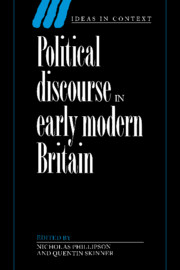Book contents
- Frontmatter
- Contents
- Contributors
- Preface
- PART I
- PART II
- 5 Parliamentary sovereignty: a very English absolutism
- 6 The civil religion of Thomas Hobbes
- 7 The rapture of motion: James Harrington's republicanism
- 8 Casuistry to Newcastle: The Prince in the world of the book
- PART III
- PART IV
- PART V
- A bibliography of the writings of J. G. A. POCOCK
- Index
- Ideas in Context
8 - Casuistry to Newcastle: The Prince in the world of the book
Published online by Cambridge University Press: 07 May 2010
- Frontmatter
- Contents
- Contributors
- Preface
- PART I
- PART II
- 5 Parliamentary sovereignty: a very English absolutism
- 6 The civil religion of Thomas Hobbes
- 7 The rapture of motion: James Harrington's republicanism
- 8 Casuistry to Newcastle: The Prince in the world of the book
- PART III
- PART IV
- PART V
- A bibliography of the writings of J. G. A. POCOCK
- Index
- Ideas in Context
Summary
Margaret, ‘Mad Meg’, Cavendish was apt to exclaim that she read nothing: and Hobbes, that had he read more he would have known less. William Cavendish prided himself on remaining largely unpoisoned by the printed page, despite the dangers of a university education; and thus qualified was appointed a governor to Charles, Prince of Wales. Straight away he warned his charge against books.
Although such affectations of pre-print recidivism should be taken with a pinch of salt, they are important in helping to disguise and rationalise the resources through which the political inheritance of early modern Britain was being transformed. Increasingly in the seventeenth century, printed texts were becoming principal reservoirs of values, idioms of discourse, and the vocabulary through which the present was patterned and with the aid of which the future was plausibly projected. This essay concerns one such text, Machiavelli's Prince, and the way in which its style of discourse was creatively adapted in a long Advice by William Cavendish, husband to Meg, friend to Thomas, mentor to Charles; and, inter alia playwright, courtier, horseman, translator, soldier, free-form speller and, above all, Machiavellian.
When considering The Prince, I take the term Machiavellian to refer to a sub-species of deliberative rhetoric, organised, as such rhetoric had been since antiquity, around the appropriation of honestas and utilitas; but couched in a personal rather than a public register. This refinement of classical rhetoric remained predicated on the contingency of human affairs and thus employed not syllogistic reasoning but enthymemic generalisations about character and circumstance, reinforced with the shared resources of history.
- Type
- Chapter
- Information
- Political Discourse in Early Modern Britain , pp. 164 - 186Publisher: Cambridge University PressPrint publication year: 1993
- 1
- Cited by



